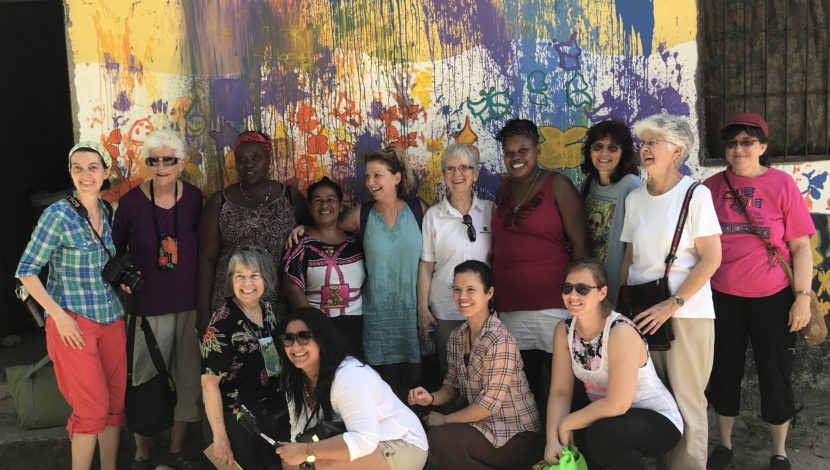The Unitarian Universalist Service Committee advances human rights through grassroots collaborations.
Hopes and Dreams in Honduras

By on May 17, 2018
This week, Unitarian Universalist Service Committee (UUSC) staff met with one of our newest partners in Honduras at our office in Cambridge. Ely Castro Rosales, a member of the Jesuit-led radio station Radio Progreso, gave an unforgettable firsthand account of the unfolding human rights crisis in Honduras and the complicity of the U.S. government.
As my colleagues Gina Collignon, Leigh Meunier, and I prepare to join Radio Progreso in Honduras this Saturday, as part of an international accompaniment delegation organized by the SHARE Foundation, Castro Rosales’ story is an inspiring example of courage in the face of repression.
As a journalist and human rights defender, Castro Rosales has been involved in justice struggles in Honduras since the 1980s. He currently serves as a regional coordinator for an activist coalition, which is mobilizing against the constitutionally suspect second term of the ruling government in Honduras. As he told us on Tuesday, he became a “social fighter” at age 13 and remained one ever since.

Radio Progreso, where Castro Rosales is on the news team, is one of the few voices in the media in Honduras who offer critical and independent reporting on human rights issues. They work closely with UUSC’s other partner in Honduras, Foro de Mujeres Por la Vida, who air a program each week on Radio Progreso, and who will also be meeting with the accompaniment delegation next week.
During his presentation Castro Rosales spoke about the threats facing democracy in Honduras, including the violence Honduran police and military forces have committed against peaceful protestors. UU College of Social Justice Director Rev. Kathleen McTigue witnessed some of this suppression first-hand during her solidarity visit to Honduras in January.
Since that time, threats to political and civil rights in Honduras have continued. As UN Special Rapporteur Michel Frost recently concluded, after a visit to Honduras from April 29 to May 12, human rights defenders and journalists—like our partners—remain especially at risk of being criminalized and attacked.
Castro Rosales’ presentation left no doubt that this violence is driven in part by the role of the United States and its allies in the region. It has been previously reported that the United States has funded and trained police units implicated in the recent human rights violations. Castro Rosales showed us photos of tear-gas canisters deployed against Honduran protesters that were manufactured in Pennsylvania.
According to Castro Rosales, Honduran police and military also receive support from the government of Colombia. This often originates from the United States as well, as the country has long sponsored efforts by the Colombian government to train security forces in Central America – despite the Colombian military’s own documented role in human rights violations against its people. The U.S. government is making it harder for people to stay in Honduras, even as it moves to deter them from seeking asylum elsewhere and to deport more Hondurans to danger.
These policies, and the violence they stoke, force more people to flee Honduras in search of safety. Mexican authorities reported a 78% increase in the number of Hondurans traveling through Mexico in February 2018, compared to just before the November 2017 election, according to the Washington Office on Latin America.
As Castro Rosales led us to reflect on our government’s culpability, however, he also made it clear that it is possible to reverse these policies. The United States can end its military and security aid to Honduras. And Congress can protect Honduran immigrants—including 86,000 Temporary Protected Status holders—from mass deportation to unsafe conditions.
What I will try to carry with me most from our talk with Castro Rosales, especially as we travel to Honduras this week, was his quiet bravery. “We are full of hopes and dreams,” he told us at the close of his presentation. “We are in this because we believe it is possible to get better conditions for all our people.”
His words invite my colleagues and me to join the delegation to Honduras not with fear, but with faith. As Radio Progreso begins its editorial segment, “Our Word” each week: Porque creemos en la necesidad de la transformación de la realidad (Because we believe it is necessary to transform reality). At UUSC, we too believe that it is necessary – and possible – to remake our shared world for the better.